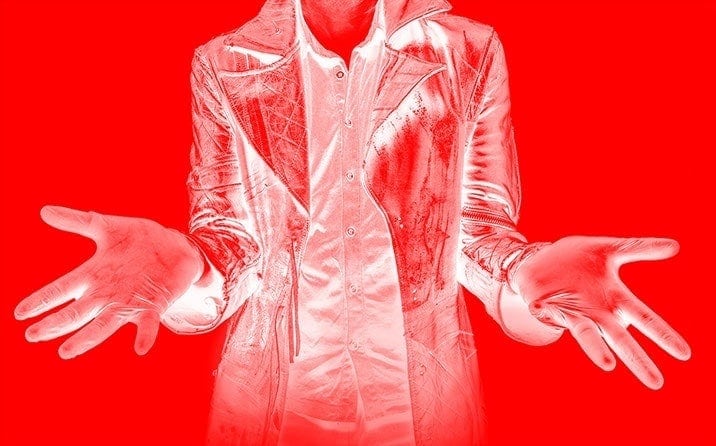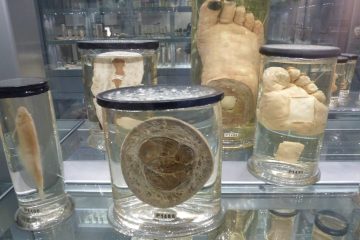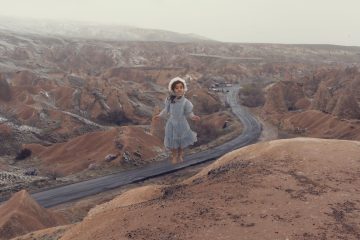
Easy Asylum Booth ‘Bundu Edition’ is part of an ongoing project by Ric Bower, in collaboration with Nástio Mosquito, which sees the Ministry of Immigration of a fictitious nation state send drones to various sites in the UK. There, Botrovia’s uniquely advanced technology will make remote tattooing possible for the first time – in fact, its enigmatic Minister for Security, Fagot Koroviev (Bower), will demonstrate the efficiency and safety of the procedure by offering his own back for inking in a live performance later this year.
Accompanied by a film made in collaboration with Issa Farfour, and quite possibly eased by an address from Botrovia’s illustrious leader A L Moore (Mosquito) piped through a bull horn during the procedure, Easy Asylum tattoo booths are coming to a town near you. Welcome to Botrovia: your passage may be painful, but not in the way we’ve come to expect from bureaucracy.

The Reverse Panopticon, Ric Bower, Nástio Mosquito & Kelly Schacht, 2019
DOUBLE MEANINGS
Easy Asylum Booth ‘Bundu Edition’ arises from Bower’s long standing relationship with Cardiff’s asylum seeker and refugee community. As such, it’s been in the works for a while; nonetheless, the recent announcement of the project coincides with the UK’s own international aid and immigration policies coming under increased scrutiny.
Bower describes how his alter-ego chose the location for Botrovia’s initial asylum push: in a nutshell, it’s because our own systems leave a lot to be desired. “Fagot’s targeting the countries that are particularly uncivilised,” explains Bower; that is, “uncivilised in terms of their approach to dealing with any guests they have.”
Bower’s Easy Asylum Booth ‘Bundu Edition’ upends the self-satisfied narrative which paints our island as a benevolent idyll for the world’s most persecuted people. After all, and according to figures from the end of 2018, the UK was home to just 126,000 refugees – a drop in the ocean compared to, say, Turkey’s 3.7 million. With that staggering gulf in mind, Bower’s concept frames the UK in a troubling new light: as somewhere to flee from, rather than to.
ArrayNO PAIN, NO GAIN
The process of seeking asylum or refugee status is notoriously long winded and bureaucratic at the best of times (imagine jumping through those hoops during the very worst, and then imagine doing it in a second language). Luckily, Botrovia is here to right those wrongs – Easy Asylum Booth ‘Bundu Edition’ does what its name promises: “the big difference between the asylum claim process in Botrovia and any European countries is that Botrovia’s only takes seven minutes.”
“After seven minutes, you have your papers – it’s as simple as that. Sure, there’s a little bit of pain on the way. You might experience some discomfort: that’s part of the tattooing process. But you’ll be given a bit of vodka, have a bit of a party…” says the artist. “Far more civilised than our system, that’s for sure.”
this work upends the self-satisfied narrative which paints our island as a benevolent idyll for the world’s most persecuted people
For all its technological razzle dazzle – Bower is working with Iranian robotics specialist Amir Karimi on a drone which really will be a world first, requiring incredible precision and the facility for generating delicate fractal images all below the weight limit of 2kg – Easy Asylum Booth ‘Bundu Edition’ is predicated on eminently human concerns.

Double-Wishbone, Lenticular-Trussed, Cantilevered-Bascule, Drone Tattoo Delivery Support System. (Presented by the Botrovian Ministry of Immigration trading as SooS® (Skin of our Skin)); Ric Bower (in collaboration with Nástio Mosquito); 2020
“Many art communities are terrified of engaging with these subjects, with these people. It’s hysterical, as well as being sad – ooh, they’re different!” says Bower. “Our project doesn’t do anything special, but that’s what’s unusual about it. Put on a fucking party. Give everyone a little something to eat. Talk. And that’s it, you know – it’s not complicated.”
ALL TOGETHER NOW
All hands on deck, at after-parties as in artwork. “I’m learning as I go”, says Bower of his developing oeuvre. “I’ve been very much mentored by Nástio and Kelly [Schacht], and they’ve been incredibly generous to me in how they’ve propagated my practice.” Speaking of that polyphonic practice, it’s hard to say where one facet begins and another ends.
ArrayFrom Bower’s alter ego Koroviev, a character lifted from Mikhail Bulgakov’s The Master and Margarita, to an official partnership with Cardiff charity Oasis in plans unfolding over years, Easy Asylum Booth ‘Bundu Edition’ is only one iteration of work which leaves very little beyond its scope. As Bower says, “The worst thing that could happen to the idea is that it be reduced conceptually. It’s all about dialogue.”
Combining activism and community work, performance and satire, leaving breadcrumbs of a pseudo archive (see below) and melding truth and fiction, Bower’s work shrugs off most attempts to categorise it. Fundamentally collaborative, Bower explains “I like the idea of a practice that is derivative. If you take over a doctor’s surgery, you don’t reinvent doctoring. You don’t need to go and reinvent the wheel.” Certainly not; the assertion begs the question, too, of how much ‘original’ art is original in the first place.

C L 73-c, pigment print of half-toned stock image, size variable, Ric Bower (in collaboration with Nástio Mosquito), 2020
REJECTED INHERITANCE
Everything in the world builds on what came before it, and the eurocentric obsession with new-ness arguably stops us benefitting from things which would bolster rather than dilute developing ideas: “I like getting away from this modernism thing – where originality is everything. Fuck originality”, says Bower.
Paradoxically, the ‘fuck originality’ premise is what makes Easy Asylum Booth ‘Bundu Edition’ so singular, at least to western eyes. The artist’s mentor-collaborator Nástio Mosquito is from Angola; his influence is eminently legible in Easy Asylum Booth ‘Bundu Edition’ for those familiar with his work, and Bower’s keen to foreground it.

Unhumanned Flying Machine, shown in Deployed Condition. Ric Bower, Nastio Mosquito, Kelly Schact, 2019
Using performance, irony –“propagating different positions” – is “something [Mosquito]’s inherited” in turn, he explains. “The idea of modernity never happened in Africa,” muses Bower. “You went straight from pre-modernity to post-modernity, from no phone to smartphone, without a line in between.”
“So now you have your traditional cultural practices alongside your mobile phone very comfortably – and that line of ‘forget modernity’ is really helpful, because we actually need to connect with something deeper here”, he continues. “Doing away with it gives us the ability to talk about things that we simply don’t have language for within the modern mindset, or even modes of talking about it. We are paralysed.”

A Tattoo Drone
SATIRE? SIMPLE
Easy Asylum Booth ‘Bundu Edition’ , like all of Bower’s projects and many of Mosquito’s too, dances a fine line. Born from a very concrete political position, the ‘solution’ proposed by the performance is satirical rather than sincere – and paradoxically, it’s that irreverence which allows it the freedom to hit hard and think big.
Occupying different characters and proposing outlandish initiatives is the work; Bower’s the first to acknowledge, for instance, the unsavoury connotations of government tattoos. “Tattoos were obviously used in very shady parts of history” – think concentration camps, slave branding – “but these are things we need to talk about. We need to be putting them on the table, and asking – how do we accept people? Well, Koroviev has a very simple answer.

Plan of Jeremy Bentham’s Panopticon penitentiary, drawn by Willey Reveley, 1791. For an earlier project, The Reverse Panopticon, 2019.
By occupying another personality, Bower’s able to operate as satirists have done for centuries. Performing, after all, is ostensibly free from explicit assertions or personal allegiances; via Koroviev, his burgeoning and expansive practice is permitted to range and ramble on its own terms.
As such, whatever Bower thinks of state-tattooing is beside the point – conjure Botrovia, and test the thought there: “It’s this simple idea of loyalty and belonging, achieved through a physical act. There’s no clear sense of belonging in our society; here you don’t know if you belong, or if you always want to belong”, he says. “In Botrovia, on the other hand, you get a tattoo and you’re in. It’s as simple as that. Is it right? I have no idea. I’m just here to take a stance, and maybe make you examine your own.”
ArrayIn that spirit, let’s add to the archive. Having spoken to Bower, I thought I’d pose a question or two to Koroviev himself. A little opaque to say the least, it’s nonetheless an honour to expand that most limitless of projects onto paper (or screen, as the case may be); the man himself:
Why have you chosen the UK to showcase Easy Asylum Booth?
Because this has been and is one of the dark places of the earth.
And although you are there — at the very end of the world, with a sea the colour of lead, and the sky the colour of smoke; we still strive to ensure that Botrovia, with all its extraordinary attractions, is easily accessible to all our asylum-seeking guests, for you have had to live in the midst of the incomprehensible.
If you feel the savagery, the utter savagery, has closed around you then pre-book your Easy Asylum Booth visit 5 days in advance — for, as you know, we live in the flicker—so there’s no better time than now to experience the magic of a successful asylum claim, for there is precious little to eat here for a civilised human being.

Trust Fagot, 2020
As the nation’s Minister for Security, what led you to implement Botrovia’s new asylum policy?
Can I ask you… is yours a fascination of the abomination— or are you experiencing growing regrets, the longing to escape, the powerless disgust, the surrender, the hate? But try not to be concerned, for a mere seven minutes under my needles affords you full refugee status in Botrovia…. but I am going at it blind (as is very proper for those who tackle a darkness). For assistance with your asylum claim we are skulking in the air, in the water, in the suburbs.
Mr Koroviev, you’ve volunteered your own back for the first drone tattooing. What made you decide on that course of action?
That is an excellent question. My strength is just an accident arising from the weakness of others therefore we reserve the right to refuse admission to certain Easy Asylum Booths should we feel there is a danger to a particular individual or individuals for whatever reason.
We have been advised by the Botrovian Health and Safety Executive that refusal on the grounds of health and safety does not constitute discrimination. We hope that you understand and accept the decisions made in the interest of your safety.

Can you explain the Botrovian cultural significance of tattooing? Are the citizens of Botrovia all tattooed?
I can. What redeems us is the idea only. An idea at the back of it; not a sentimental pretence but an idea; and an unselfish belief in the idea—something you can set up, and bow down before, and offer a sacrifice to. In spite of this face masks are still required in all Easy Asylum Booths, so please bring a suitable face covering with you.

I commend Botrovia on its forward-thinking approach to using technology to streamline its bureaucratic processes. Would you say Botrovia is leading the way, in terms of high-tech solutions to eternal human problems?
Yes, most certainly. What will save you is our efficiency—our devotion to efficiency. For if you are human enough to face the darkness then please take advantage of what our latest offer affords. It is based on a minimum of seven minutes and a maximum of twelve minutes under my many needles.
Where is Botrovia? Can you give our readers some idea of the life they’ll be living if they take up your nation’s generous offer of asylum?
Darkness was here yesterday but our Botrovian quasi-colonial agenda offers plenty of space for you and your people to enjoy today! We’re ready to welcome you and big opportunities are available as part of your asylum package (available for arrivals between 2nd November 2020 – 2nd January 2021). You must grab what you can get for the sake of what has to be got.
Find out about our latest deals and stay updated with our special offers by contacting the Botrovian Ministry of Immigration (trading as Skin of our Skin®) directly… And why would you not? (Except afterwards to brag of what you have gone through in your time).
Easy Asylum Bundu Edition is supported by Arts Council Wales and Axisweb.
Ric Bower seeks to explore how aesthetics and satire might be used to disclose truth in a political context. These enquiries are often centred around issues relating to asylum policy. Bower trained first as a draughtsman then as a photographer; his practice now extends into writing, design, performance and tattooing. Bower says of his practice ‘I do not want to make work that sits meekly in the gallery waiting to be observed. I want to make work that follows you out of the gallery to your car, slithers into the back seat behind you and then shanks you as you drive home’.
Nástio Mosquito is a multimedia, performance and spoken word artist. Often placing himself centre stage in the work, Mosquito deploys mimicry to explore global and African politics. He typically assumes roles not insomuch that they reflect his own cherished beliefs, but rather as an artifice to express cunning observations on human follies manifesting in modern life.
Belgian artist Kelly Schacht plays with the notions of authorship and originality in her work. Both moments and objects from the past are rethought and become able to generate a renewed aesthetic. She has exhibited internationally and her work is represented by Meessen De Clercq and Tegenboschvanvreden.
Oasis is a charity based in Cardiff which aims to ‘help refugees and asylum seekers integrate with their local community’. Find out more or donate here.


